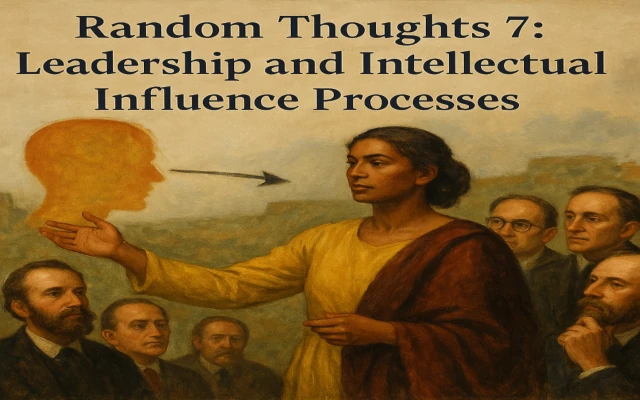By News Karnataka Editorial Team
Copyright newskarnataka

Down the centuries, several great leaders strode the earth and offered their leadership, some for the welfare of the people and some others for their own grandiose plans. These leaders were able to influence people in different dimensions for collective actions, among which included the annexing of geographical areas and defeat of other leaders, even those who had the legitimacy, and to work as powerful leaders.
However, the research and the associated studies done by a large number of interested thinkers and researchers during the twentieth century is the best of written matter available on leadership for anyone who wants to understand the concept of leadership. A person becomes a great leader when she is able to influence others and bring them to her side of a belief and to continue to guide them as their leader. A persuasive leader enjoys several benefits among which creativity and the resultant peacefulness from fulfilment are those which take her to sublime shores.
So, an alternative or equivalent word for leadership is influence. Undoubtedly, influence should make changes in the person who is being influenced. It could be behavioural or in thinking processes or in responding to others or in taking decisions or solving problems in which one may even be the loser.
While considering influence processes, one has to think about spheres of influence. The primary influence area is personal. An individual gets influenced and makes the necessary changes in her personal living. A mother may be able to influence a son or daughter to stop playing enjoyable video games or give up a cherished friendship. There are spheres of officialdom that make people get influenced. A boss may influence a subordinate or the opposite may also happen. Another sphere is that which is connected to the sex of the individual. A male may influence a female more or a female may influence a male more. There are social spheres where the influence processes may work. Simple things like patterns of food consumption and their systems can be influenced and hence any collective may become more tolerant of items of food which otherwise would not have been permitted on the table. There are organisational spheres of influence. A new director may take over and influence the employees to abandon old systems of work or create new structures in production areas as well as relationship areas. There could also be situational spheres where people get influenced. It is possible that being placed in a specific environment or circumstance may influence an individual for specific reasons.
In a large number of cases, influencing is necessary in the field of ignorance which is as powerful and natural as knowledge. Changes are also necessary through influence processes at work in the inadequacy or incapacity of people. Lack of interest or lack of awareness is also a field in which influence processes can easily work. An enhancement and upgradation of the intellectual, social, cultural or moral capital are also fields where changes can be influenced.
Among several processes including bribes or threats, the communication exchange process is considered the most powerful in bringing about changes. Communication is a competence in which conceptual clarity or knowledge or a particular quantity of information is available with an individual who is able to apply the skills or use the tools to speak or respond to others, with the use of the concept, knowledge or information and in the exchange of thoughts or even arguments, intellectually influence the other person. Therefore, communicating to influence is actually a leadership competence.
Intellectually influencing is the greatest of all influences as changes made because of intellectual influences have greater chances of staying with the individual for longer durations. Such influences generally are through communication. Its exchange processes are plenty. Among the exchange processes, dialogue is the most powerful influence process. Even conversations, which need not be a planned way of interacting with one another as it happens in a dialogue, may influence another person intellectually. In fact, most of the contents of communication are meant to influence the listener.
Intellectual influence processes can be effective only when the contents of the mind are influenced. Every individual has several types of contents in her mind. They may be stories, events, episodes, thoughts, ideas, concepts, theories and most importantly, impressions of experience that one would have gone through. As long as these remain as contents of the mind, human behaviour will be governed by them. So, a change is possible only when there is a change in the content, the processes may be elimination or addition. Even a flicker of a thought that has been picked from a casual conversation can influence a deletion of the content of the mind or an addition of a new idea that may govern the behaviour of the individual or influence the lifestyle of a person. The contents of the mind which are responsible for specific behaviour or actions of a person keep changing from time to time because of deletion of the old or addition of the new.
Intellectual influence process, which is the best among influence processes, can happen only when the ‘theory of mind’ also is considered. The ‘theory of mind’ propagates that the intellectual influence process will work successfully and effectively only when an influencer is able to communicate after taking into consideration what is in the mind of the listener or the influenced. Even the best of arguments, examples or support of other individuals who think in like manner may not influence the listener or the follower unless the person who communicates knows well what is in the mind of the other person and communicates accordingly. Therefore, a leader can influence a follower or a listener only when she is very sure about what is in the mind of the listener or the follower. Based on these pieces of information or knowledge one has to plan the content and strategy of communication so as to influence the follower.
………………………………….
Prof. Sunney Tharappan, is Director of College for Leadership and HRD, Mangaluru. He trains and writes and lives in Mangaluru. Email: tharappans@gmail.com



